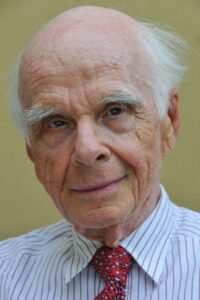Not many of you know I put together an anthology of Thomas Berry’s works, which I translated into Dutch.
Ervin Laszlo, the great philosopher and systems thinker wrote the foreword. Here in English.

The last time I saw Thomas Berry was in Mexico in the late 1990s. He remarked that he sees himself as a man of the 20th century, born in the second decade of that century, and hoping to live to the end of its last decade. In fact, Berry lived almost a full decade into the 21st century.
Berry’s thought exceeded his own estimation of himself. He was truly a man not just of the 20th but also of the 21st century: the relevance and meaning of his ideas, his warnings, and his vision became more manifest in the new century than they did in the old. Few thinkers have been as much ahead of their times as Thomas Berry. Many of Berry’s writings seem as if they were committed to paper today, by a prophetic mind of the 21st century.
Berry diagnosed problems that are only now emerging into public awareness. He had amazing foresight. “… (T)hrough human presence the forests of the earth are destroyed. Fertile soils become toxic and then wash away in the rain or blow away in the wind. Mountains of human-derived waste grow ever higher. Wetlands are filled in. Each year approximately ten thousand species disappear forever. Even the ozone layer above the earth is depleted.”
The human-caused disasters of our time are not limited to the ecology. Berry continued: “Such disturbances in the natural world coexist with all those ethnic, political, and religious tensions that pervade the human realm. Endemic poverty is pervasive in the Third World, while in the industrial world people drown in their own consumption patterns. Population increase threatens all efforts at improvement.”
To cope with these problems we need more than better strategies and improved technologies. Berry warned us that we must not mistake the order of magnitude of the challenge. What is needed is “not simply adaptation to a reduced supply of fuels or to some modification in our system of social or economic controls.” Yet this is precisely what today, in the final year of Berry’s long life, we are attempting to do. Our efforts are centered on finding cheaper sources of energy, and on re-stabilizing our crisis-bound and now obsolete economic-financial system by pumping fresh money into it. We should listen to Berry. “What is happening is something of a far greater magnitude. It is a radical change in our mode of consciousness. Our challenge is to create a new language, even a new sense of what it is to be human.”
Berry identified our problems and told us that their order of magnitude includes a change in human consciousness. He told us how our problems have come about: “…(W)e are just emerging from a technological entrancement. During this period the human mind has been placed within the narrowest confines it has experienced since consciousness emerged from its Paleolithic phase.”
Contrary to the widespread belief that the modern world is immeasurably superior to the world of bygone ages, Berry noted, “Even the most primitive tribes have a larger vision of the universe, of our place and functioning within it, a vision that extends to celestial regions of space and to interior depths of the human in a manner far exceeding the parameters of our own world of technological confinement.”
“While former civilizations established our exalted place within the seasonal sequence of the earth’s natural rhythms and established those spiritual centers where the meeting of the divine, the natural, and the human could take place, the new effort, beginning in the sixteenth and seventeenth century work of Francis Bacon, Galileo Galilei, and Isaac Newton, was less concerned with such psychic energies than with physical forces at work in the universe and the manner in which we could avail ourselves of these energies to serve our own well-being.” The responsibility for this ‘new effort’, to be sure, we should not ascribe to the great pioneers of modern science – for they were themselves deeply spiritual people with vast horizons – but to their followers: the Galileans and the Newtonians who had mistaken a frame of explanation for the mechanistic regularities observed in the natural world for the fundamental nature of that world. It was they who had given birth to what Berry called the ‘objective world’: “a world clearly distinct from ourselves and available not as a means of divine communion, but as a vast realm of natural resources for exploitation and consumption.”
Clearly, we are facing critical problems, but what is it that needs to be done? Berry’s advice remains clear and timely. Basically, he told us, “what we need, what we are ultimately groping toward, is the sensitivity required to understand and respond to the psychic energies deep in the very structure of reality itself.” “I suggest,” Berry added, “that this is the ultimate lesson in physics, biology, and all the sciences, as it is the ultimate wisdom of tribal peoples and the fundamental teaching of the great civilizations.”
But how are we to evolve this ‘sensitivity’? Here we should heed Berry again. “We need only to listen to what we are being told through the very structure and functioning of our being.” Because, he told us, “the universe is so immediate to us, is such an intimate presence, that it escapes our notice, yet whatever authenticity exists in our cultural creations is derived from these spontaneities within us, spontaneities that come from an abyss of energy and a capacity for intelligible order of which we have only the faintest glimmer in our consciousness awareness.”
Accessing the spontaneities of the universe calls for a vision that is dream-like. Imagination functions most freely in dream vision, and so we tend to associate creativity with dream experience. “The dream comes about precisely through the uninhibited spontaneities of which we are speaking,” said Berry. “In the beginning was the dream. Through the dream all things were made, and without the dream nothing was made that has been made.” “We are immersed in the depths of our own being and of the cosmic order itself in the dream-world that unfolds within us in sleep, or in the visionary moments that seize upon us in our waking hours.”
The one aspect of Berry’s thinking that calls for updating is his insistence that we reach the spontaneities of the cosmic order by returning to the information that is encoded in our genes. Today we would no longer say that, “Our bonding with the larger dimensions of the universe comes about primarily through our genetic coding.” Genetic coding, to be sure, is the basis, but it is only the template for the more specific guidance that comes about as our genetically coded cells and organs interact with each other, with the surroundings, and with the rest of the universe, and create us, a unique yet natural being. Genetic coding in itself is not “the determining factor.” It is through a complex, continuous, and subtle interaction that we maintain “our intimate presence to the functioning of the earth community and to the emergent processes of the universe itself.”
But Berry’s basic insight remains entirely valid. “(T)he present situation is so extreme that we need to get beyond our existing cultural formation, back to the primary tendencies of our nature itself, expressed in the spontaneities of our being.”
We can derive solace and draw courage from Berry’s assurances. “(W)e are not left simply to our own rational contrivances. We are supported by the ultimate powers of the universe as they make themselves present to us through the spontaneities within our own beings.”
The brightest glimmer of hope shimmering at the darkening horizons of the current global crisis is, in Berry’s words, that “the universe is revealing itself to us in a special manner just now. Also the planet Earth and the life communities of the earth are speaking to us through the deepest elements of our nature …”
In this introductory overview of the unique contemporary relevance of Thomas Berry’s thinking, I have left it to Berry to speak to us. Nobody could have articulated the nature of our problems, the reasons for our problems, and the way we should seek to resolve our problems, better than he did.

